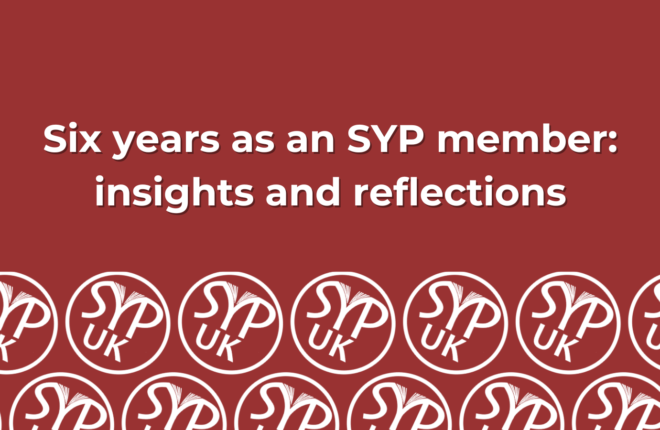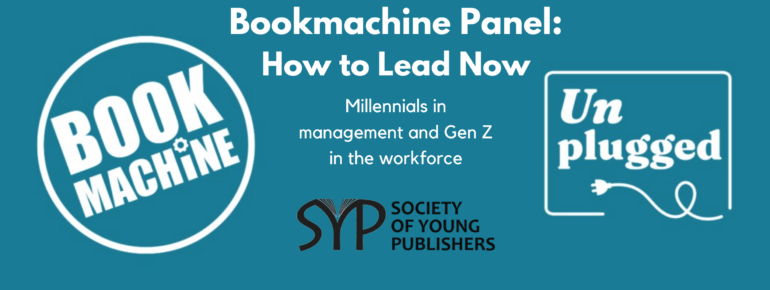
Bookmachine Panel: How to Lead Now: Millennials in management and Gen Z in the workforce
Posted on January 2, 2024 in UK

Navigating hybrid work structures, prioritizing team well-being, and juggling a host of other priorities make leadership an important skill to develop. In November 2023, we had the opportunity to attend Bookmachine’s panel event about Management and supporting the next generation. It provided interesting thoughts on what those in leadership positions could do to better understand those that they are managing, what are the priorities of Gen Z colleagues, and what entry-level colleagues could do to maximise their relationship with their managers. To generalise, millennials are born between 1981 and 1996 whilst Gen Z’ers are born between the late 1990s and early 2000s. As such, with the SYP supporting those in their first ten years in publishing, it was a useful topic that one might expect would traverse our two streams: INTO and AHEAD.
In this blog post, we delve into a thoughtful discussion with industry and thought leaders—Mags Abraha, Amy Mae Baxter, Sanphy Thomas, and Jake Richings—as they share insights on the changing dynamics of leadership, and some of the key priorities for Gen Z in the workplace.
Clear, continuous learning and development
Jake Richings, Director of Authentic Engagement, sheds light on the priorities of Gen Z when seeking careers. Burnout, salary concerns, are always worthy discussion points, but Richings reemphasised how critical it is that companies support Gen Z’ers desire for continuous learning and relevant experience emerge. A report from Richings as part of his work at Authentic Engagement states that only 60% of individuals aged 26 and younger feel engaged in their careers, emphasising the need for companies to address these concerns.
In terms of development, throughout the panel the usefulness of making clear trajectories for your employees and then holding yourself accountable for checking in with them at regular points to ensure they are being developed and supported throughout their time in the company.
Feeling valued
Amy Mae Baxter, Commissioning Editor at Avon and founder of BadForm, added to this discussion. To Baxter, it is clear that publishing professionals rarely get into the industry on the understanding that they will make lots of money in the process and it can’t be used as the sole reason for low retention rates in the publishing industry. For Baxter, it is the lack of feeling heard and valued that plays a significant role in Gen Z’ers engagement in the workplace. This seemed to be a thought shared by the entire panel, and the audience were reminded to tell anyone that they oversee that they are valuable and to actively emphasise how the tasks they complete, and the input that they have is valuable.
Able to add value
Sitting alongside this, is the idea that Gen Z professionals need to be able to add value. Typically entry-level roles often involve a high level of administrative work, but for some on the panel, it is important that Gen Z professionals are given the space to explore their passions and interests beyond this as well.
For the panel, it was important for employees to allow space for extra-curricular activities such as company networks and societies. This is a way for Gen Z-ers to feel like they have community and fell like their opinions can be channelled, even if it’s not part of their job. To this, Baxter highlights the longstanding issue of retention in diversity and inclusion schemes which is a long-standing issue. Baxter flags the importance of contribution and significant involvement in different areas of a publishing company, and for publishing to take a more inclusive and adaptable approach to ensure talent is not lost.
Sanphy Thomas, Managing Director of Jessica Kingsley Publishers, discusses the activities of two younger colleagues in her company who have been space to develop their ideas: one is currently working to develop an AI system to help search through the Jessica Kingsley directory more easily, whilst one displayed an active interest in an area that she felt was missing from the content currently produced by the company, and has been given the space to develop this content and area of publishing.
What follows was a thought-provoking discussion about how to offer entry-level professionals this space amidst their other administrative heavy duties, and at what point they can be rewarded for these activities. It is understandable that companies can’t always promote individuals at the beginning of these ideas, before a proven return on investment to the company. However, Baxter cites some shorter term solutions that companies could display the achievements of younger colleagues. For instance, internal company awards with vouchers, getting your work celebrated internally in company wide celebrations.
Company Culture
Another point raised was the conflicting ideas of what it means to have work-life balance between millennials and Gen Z-ers. Whilst millennials might define work-life balance as the rigid maintenance of 9-5 hours, for Gen Z-ers, work-life balance might mean longer hours but more flexibility to work hours that best suit them. Sanphy Thomas discusses the challenges of a company being rigid and inflexible, whilst also flagging the limitations of technology in the publishing industry itself which sits at odds with the younger generation.
Richings discusses the impact of the pandemic. Having grown up amidst a pandemic, they value flexibility and authenticity. Thomas also stresses the importance of creating an open and respectful environment. Acknowledging and embracing generational differences, avoiding dismissiveness, and aligning company values with individual beliefs are crucial steps in fostering cross-generational relationships. To this, Richings discusses the impact of Reverse mentoring. This is when Senior colleagues can learn from younger colleagues, and it is introduced as a valuable strategy to bridge the generational gap and enhance decision-making.
Key touchpoints: What Gen Z can do?
- Articulate Job expectations: Baxter encourages individuals to articulate their expectations and desires from their jobs. Open communication between managers and team members is key to ensuring alignment, flexibility and job satisfaction.
- Keep track of key achievements and your goals to maximise the effectiveness of one-on-one discussions with managers and ensure you are getting the most out of your role.
- Don’t be afraid to create spaces where you can add value in a company: There are an increasing range of internal networks and activities to join that might align with your values. However, there are also opportunities to make new spaces that are in tune with your passions and also add value to the company itself.
- If applying for new roles, keep in mind the confusing job role titles. This was discussed as part of the panel as a confusing area of the business and something that must be tackled. An example of this is the core difference between the position of Assistant Editor and the entry-level role of Editorial Assistant.
As the publishing industry witnesses a shift in leadership dynamics with Millennials taking charge and Gen Z entering the workforce, the key lies in understanding and embracing the unique perspectives each generation brings. The emphasis on open communication, flexibility, and a commitment to diversity and inclusion will not only foster a more engaging work environment but also position publishing professionals for success in this ever-changing landscape. By learning from the experiences and insights shared by the panelists, publishing leaders can navigate the challenges of today’s workplace and steer their teams toward a more innovative and inclusive future.
SYP members benefit from 30% off membership to BookMachine. Please get in touch with sypchair@thesyp.org.uk for more information. You can explore a range of other exclusive SYP membership benefits here.




 Listen to the podcast
Listen to the podcast  Explore the Youtube channel
Explore the Youtube channel